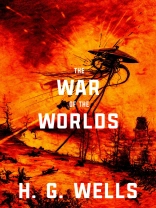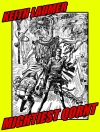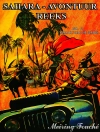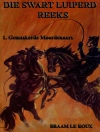H. G. Wells’ classic alien invasion tale, The War of the Worlds, is one of science fiction’s most important novels.
Humans are unprepared when an armada of warring Martians land in southeast England in gigantic cylinders and wreak havoc as they close in on London. The Martians use huge three-legged fighting machines armed with deadly heat rays, which Wells describes as ‘this flaming death, this invisible, inevitable sword of heat.’ Humans eventually mount a jumbled defense against what appears to be an implacable and unbeatable enemy. The story reads almost like dispatches from a war zone told by ordinary, frightened humans whose fate is determined by a freak turn of events.
Wells’ wild, harrowing story can be appreciated as much for its prescience and inventiveness as for its astute social commentary.
This Warbler Classics edition includes a detailed biographical timeline.
Mục lục
Contents
BOOK ONE. THE COMING OF THE MARTIANS1
I. The Eve of the War3
II. The Falling Star9
III. On Horsell Common13
IV. The Cylinder Opens16
V. The Heat Ray20
VI. The Heat-Ray in the Chobham Road24
VII. How I Reached Home27
VIII. Friday Night31
IX. The Fighting Begins34
X. In the Storm40
XI. At the Window46
XII. What I saw of the Destruction of Weybridge and Shepperton.52
XIII. How I Fell in with the Curate62
XIV. In London67
XV. What Had Happened in Surrey77
XVI. The Exodus from London85
XVII. The Thunder Child97
BOOK TWO. THE EARTH UNDER THE MARTIANS107
I. Under Foot109
II. What We Saw from the Ruined House116
III. The Days of Imprisonment125
IV. The Death of the Curate.130
V. The Stillness.135
VI. The Work of Fifteen Days138
VII. The Man on Putney Hill142
VIII. Dead London156
IX. Wreckage164
X. The Epilogue169
Biographical Timeline173
Giới thiệu về tác giả
H. G. Wells (1866-1946) was an English writer of novels, short stories, history, social criticism, and biography. With Jules Verne, he is considered the ‘father of science fiction’ and thought by many to be the most distinct mythmaker of his time. He envisioned such things as time travel, alien invasion, invisibility, biological engineering, and cosmic threats long before they existed or were conceived of by others. In addition to enjoying popular success, Wells was nominated for the Nobel Prize in Literature four times. He died in London, England, on August 13, 1946, at the age of seventy-nine.












